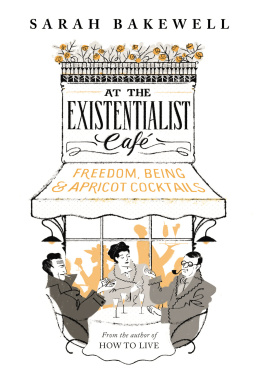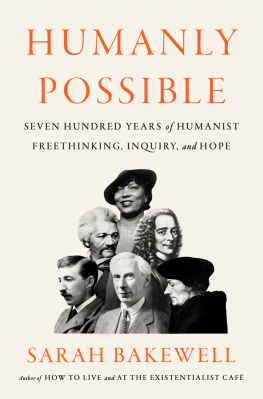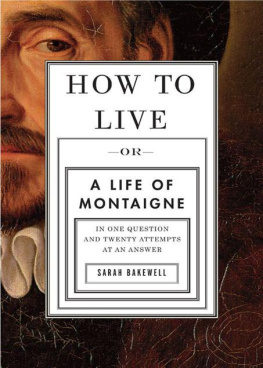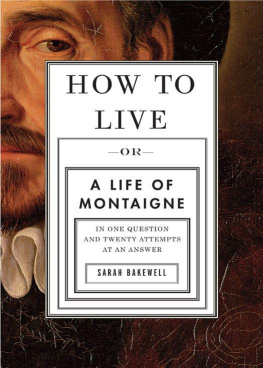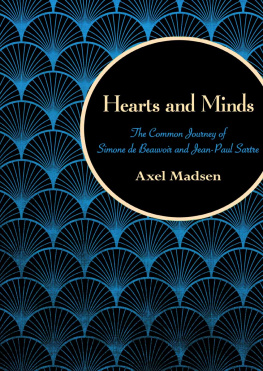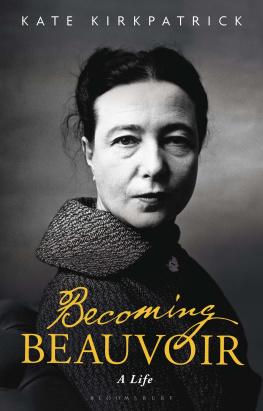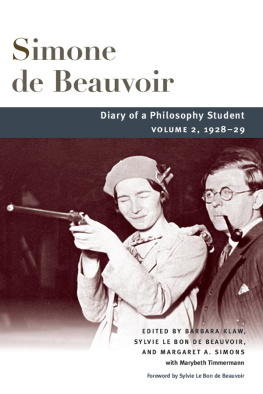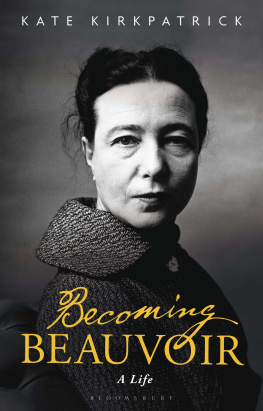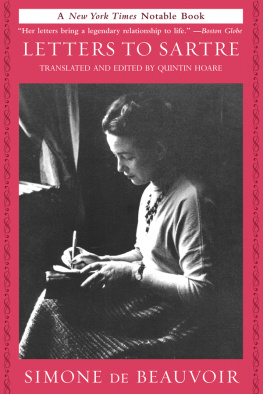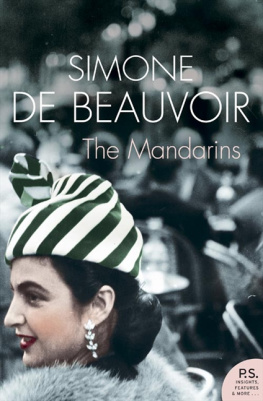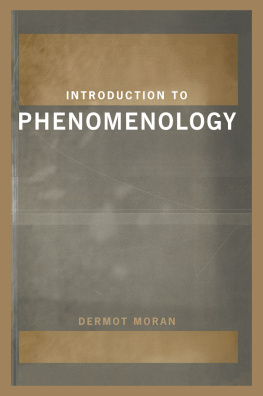Contents
CONTENTS

This ebook is copyright material and must not be copied, reproduced, transferred, distributed, leased, licensed or publicly performed or used in any way except as specifically permitted in writing by the publishers, as allowed under the terms and conditions under which it was purchased or as strictly permitted by applicable copyright law. Any unauthorized distribution or use of this text may be a direct infringement of the authors and publishers rights and those responsible may be liable in law accordingly.
Epub ISBN: 9781473545328
Version 1.0
1 3 5 7 9 10 8 6 4 2
Chatto & Windus, an imprint of Vintage,
20 Vauxhall Bridge Road,
London SW1V 2SA
Chatto & Windus is part of the Penguin Random House group of companies whose addresses can be found at global.penguinrandomhouse.com.

Copyright Sarah Bakewell 2016
Sarah Bakewell has asserted her right to be identified as the author of this Work in accordance with the Copyright, Designs and Patents Act 1988
First published by Chatto and Windus in 2016
www.vintage-books.co.uk
A CIP catalogue record for this book is available from the British Library
ISBN 9780701186586
For Jane and Ray
BY THE SAME AUTHOR
The Smart
The English Dane
How to Live: or A Life of Montaigne
in one question and twenty attempts at an answer
About the Author
Sarah Bakewell was a teenage existentialist, having been swept off her feet by reading Sartres Nausea, aged 16. She is the author of three biographies, including the bestselling How to Live: A Life of Montaigne, which won the Duff Cooper Prize for Non-Fiction and the National Books Critics Circle Award for Biography in the US, and was shortlisted for the Costa Biography Award and the Marsh Biography Award.
About the Book
Paris, near the turn of 1933. Three young friends meet over apricot cocktails at the Bec-de-Gaz bar on the rue Montparnasse. They are Jean-Paul Sartre, Simone de Beauvoir and their friend Raymond Aron, who opens their eyes to a radical new way of thinking. Pointing to his drink, he says, You can make philosophy out of this cocktail!
From this moment of inspiration, Sartre will create his own extraordinary philosophy of real, experienced life of love and desire, of freedom and being, of cafs and waiters, of friendships and revolutionary fervour. It is a philosophy that will enthral Paris and sweep through the world, leaving its mark on post-war liberation movements, from the student uprisings of 1968 to civil rights pioneers.
At the Existentialist Caf tells the story of modern existentialism as one of passionate encounters between people, minds and ideas. From the king and queen of existentialism Sartre and de Beauvoir to their wider circle of friends and adversaries including Albert Camus, Martin Heidegger, Maurice Merleau-Ponty and Iris Murdoch, this book is an enjoyable and original journey through a captivating intellectual movement. Weaving biography and thought, Sarah Bakewell takes us to the heart of a philosophy about life that also changed lives, and that tackled the biggest questions of all: what we are and how we are to live.
1
Sir, What a Horror, Existentialism!
In which three people drink apricot cocktails, more people stay up late talking about freedom, and even more people change their lives. We also wonder what existentialism is.
IT IS SOMETIMES said that existentialism is more of a mood than a philosophy, and that it can be traced back to anguished novelists of the nineteenth century, and beyond that to Blaise Pascal, who was terrified by the silence of infinite spaces, and beyond that to the soul-searching St Augustine, and beyond that to the Old Testaments weary Ecclesiastes and to Job, the man who dared to question the game God was playing with him and was intimidated into submission. To anyone, in short, who has ever felt disgruntled, rebellious, or alienated about anything.
But one can go the other way, and narrow the birth of modern existentialism down to a moment near the turn of 1932 , when three young philosophers were sitting in the Bec-de-Gaz bar on the rue du Montparnasse in Paris, catching up on gossip and drinking the house speciality, apricot cocktails.
The one who later told the story in most detail was Simone de Beauvoir, then around twenty-five years old and given to watching the world closely through her elegant hooded eyes. She was there with her boyfriend, Jean-Paul Sartre, a round-shouldered twenty-seven-year-old with down-turned grouper lips, a dented complexion, prominent ears, and eyes that pointed in different directions, for his almost-blind right eye tended to wander outwards in a severe exotropia or misalignment of the gaze. Talking to him could be disorienting for the unwary, but if you forced yourself to stick with the left eye, you would invariably find it watching you with warm intelligence: the eye of a man interested in everything you could tell him.
Sartre and Beauvoir were certainly interested now, because the third person at the table had news for them. This was Sartres debonair old school friend Raymond Aron, a fellow graduate of the cole normale suprieure. Like the other two, Aron was in Paris for his winter break. But whereas Sartre and Beauvoir had been teaching in the French provinces Sartre in Le Havre, Beauvoir in Rouen Aron had been studying in Berlin. He was now telling his friends about a philosophy he had discovered there with the sinuous name of phenomenology a word so long yet elegantly balanced that, in French as in English, it can make a line of iambic trimeter all by itself.
Aron may have been saying something like this: traditional philosophers often started with abstract axioms or theories, but the German phenomenologists went straight for life as they experienced it, moment to moment. They set aside most of what had kept philosophy going since Plato: puzzles about whether things are real or how we can know anything for certain about them. Instead, they pointed out that any philosopher who asks these questions is already thrown into a world filled with things or, at least, filled with the appearances of things, or phenomena (from the Greek word meaning things that appear). So why not concentrate on the encounter with phenomena and ignore the rest? The old puzzles need not be ruled out forever, but they can be put in brackets, as it were, so that philosophers can deal with more down-to-earth matters.
The phenomenologists leading thinker, Edmund Husserl, provided a rallying cry, To the things themselves! It meant: dont waste time on the interpretations that accrue upon things, and especially dont waste time wondering whether the things are real. Just look at this thats presenting itself to you, whatever this may be, and describe it as precisely as possible. Another phenomenologist, Martin Heidegger, added a different spin. Philosophers all through history have wasted their time on secondary questions, he said, while forgetting to ask the one that matters most, the question of Being. What is it for a thing to

